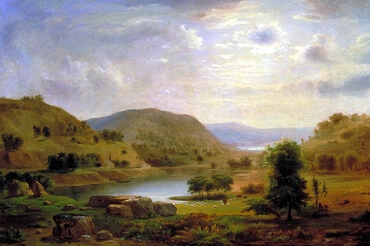1
Ja hän vei minun jälleen templin oven eteen, ja katso, siellä juoksi vesi templin kynnyksen alitse itään päin; sillä templin ovi oli itään päin; ja vesi juoksi templin oikialta puolelta lounaaseen päin, alttarin ohitse.
2
Ja hän vei minun ulos pohjoista porttia päin, ja vei minun ympäri sitä tietä ulkoisesta portista itään päin; ja katso, vesi juoksi oikialta puolelta sieltä ulos.
3
Ja mies läksi itään päin, ja mittanuora oli hänen kädessänsä, ja mittasi tuhannen kyynärää, ja hän vei minun veteen minun pöytäjalkoihini saakka.
4
Ja mittasi vielä tuhannes kyynärää, ja vei minun veteen polviini saakka; ja mittasi jälleen tuhannen kyynärää ja antoi minun mennä siihen kupeisiin saakka.
5
Niin hän mittasi vielä tuhannen, että niin syvä tuli, etten minä enään pohjaan ulottunut; sillä vesi oli niin syvä, että siinä täytyi uida, ja ei ulottunut pohjaan.
6
Ja hän sanoi minulle: sinä ihmisen poika, tämän olet sinä kyllä nähnyt; ja hän vei minun jälleen ojan reunalle.
7
Ja kuin minä itseni käänsin, katso, siellä oli sangen monta puuta rannalla molemmilla puolilla.
8
Ja hän sanoi minulle: tämä vesi, joka itään päin juoksee, pitää juokseman paljaan maan lävitse mereen; ja kuin se tulee mereen, niin sen vedet terveellisiksi tulevat.
9
Ja kaikki, jotka siinä elävät ja liikkuvat, kuhunka nämät virrat tulevat, niiden pitää elämän; ja pitää oleman sangen paljo kaloja; ja kaikki pitää terveet oleman ja elämän, kuhunka tämä virta tulee.
10
Siinä pitää oleman kalamiehet; Engeddistä niin Eneglaimiin asti pitää verkkoja pantaman; sillä siinä pitää oleman lajinsa jälkeen sangen paljo kaloja, niinkuin suuressakin meressä.
11
Mutta järvet ja suovedet ei pidä oleman terveelliset, mutta suolaiseksi tuleman.
12
Ja molemmin puolin ojan rantoja pitää kasvaman kaikkinaisia hedelmällisiä puita, joiden lehdet ei pidä variseman, eikä hedelmät mätänemän; ja heidän pitää joka kuu kantaman uuden hedelmän; sillä heidän vetensä vuotaa pyhästä, heidän hedelmänsä kelpaavat ruoaksi, ja heidän lähteensä lääkitykseksi.
13
Näin sanoo Herra, Herra: nämät ovat rajat, joiden jälkeen teidän pitää kahdelletoistakymmenelle Israelin sukukunnalle maan jakaman; mutta kaksi osaa tulee Josephin suvulle.
14
Ja teidän pitää sen yhtäläisesti jakaman, niin yhdelle kuin toisellekin; sillä minä olen vannonut sen antaakseni teidän isillenne, ja tämä maa pitää tuleman teille perinnöksi.
15
Tämä on maan raja: pohjaan päin, isosta merestä, Hetlonin tietä niin aina Zedadiin,
16
Hematiin, Berotoon, Sibraimiin, jotka Damaskun ja Hematin rajain välillä ovat, ja HatsarTikoniin, joka Havran rajaan ulottuu.
17
Ja raja merestä niin Hatsar-Enoniin on Damaskun raja, ja Zaphon pohjaan päin Hamatin raja: ja se on pohjan puoleinen kulma.
18
Mutta rajan itään päin pitää teidän mittaaman Havran ja Damaskun väliltä ja Gileadin väliltä, ja koko Israelin väliltä, Jordanin tykönä, rajasta itämereen saakka; se pitää oleman raja itään päin.
19
Mutta raja lounaaseen päin on Tamarista aina Kadekssen riitaveteen saakka, ja virtaan asti suuren meren tykönä; sen pitää oleman rajan lounaasen päin.
20
Ja raja länteen päin on isosta merestä, rajasta kohdastansa aina Hamatiin; se on raja länteen päin.
21
Ja näin teidän pitää jakaman maan teillenne Israelin sukukunnissa.
22
Ja kuin te arvan heitätte maata jakaissanne teidän välillänne, niin teidän pitää muukalaisia pitämän, jotka asuvat teitä läsnä, ja elävät eli siittävät lapsia teidän seassanne, niinkuin he olisivat Israelin lasten seassa syntyneet lapset.
23
Ja muukalaisten pitää saaman osansa maasta, kukin sen suvun seassa, jota läsnä hän asuu, sanoo Herra, Herra.







